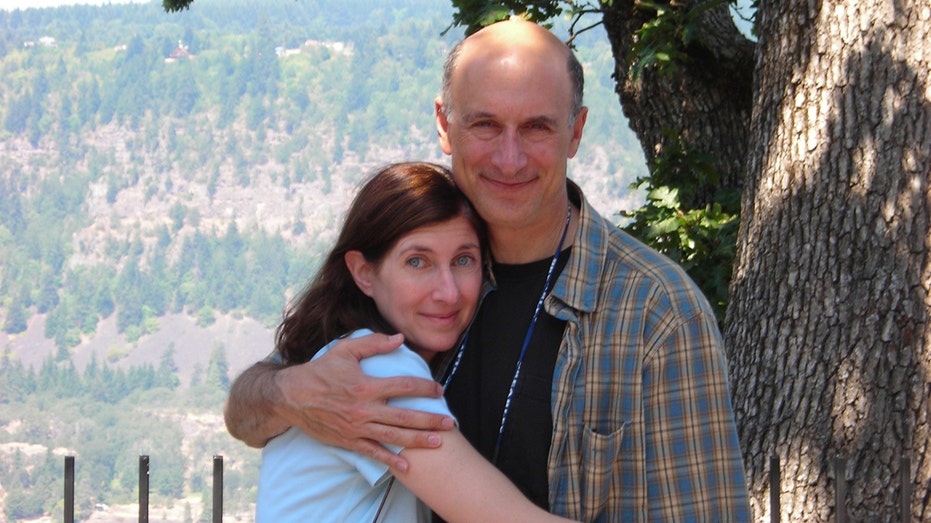3 surprising lessons after losing a spouse and trying to move forward in life: 'Still evolving'
Author Warren Kozak of New York City has written a moving book about the loss of his wife to cancer and the emotional and psychological fallout — also sharing tips and advice for others.

New York City-based author and essayist Warren Kozak, who lost his beloved wife to cancer on Jan. 1, 2018, has written "Waving Goodbye: Life After Loss" (Post Hill Press, April 2024), a new book that describes his wrenching experiences and the continuing fallout from the loss of his wife, Lisa Krenzel, his best friend and mother of their now-grown daughter.
Not just a personal account, though, his book also shares tips and inspiration for others.
It addresses such practical matters as writing wills, leaving instructions and getting affairs in order for peace of mind and the benefit of loved ones.
The book seizes on a wider reality in America.
"Everyone will deal with this. Every relationship will end this way, at some point," the author told Fox News Digital — with the exception of a divorce or separation.
"Have you seen the numbers?" he said. "There are 3.7 million widowers in this country and 11.5 million widows right now," he said.
"That's 6% of the population who have lost a spouse," he said, quoting U.S. Census Bureau figures — "and that number is going to skyrocket very soon, as the baby boomers start to take their leave."
Among his takeaways when it comes to losing a spouse:
"I never expected to write this book. It is different from anything else I've ever written," he said.
FLORIDA BRIDE-TO-BE GOES VIRAL FOR SHARING TEXT FROM HER FIANCE'S FATHER AFTER MARRIAGE PROPOSAL
Thanks to a daily diary he's been keeping for most of his adult life, Kozak was able to go back in time and refresh himself in vivid detail about life with his wife — both the good times and the very, very difficult times during her illness in her final years, he said.
After she passed away, "people brought books" to him in an effort to be helpful, he said.
"Most of them were written in a very academic style, by psychologists, grief counselors, clergy" and others.
As well-intentioned as those gifts were, he said he found those books about loss hard to read.
"When you go through a huge trauma," he said, "your brain doesn't function the way it used to function." That is not something, he said, that most people are prepared for or think about.
"And after she died, my brain just went out to lunch … I couldn't read."
As a result, he wanted to write something that could be useful to others who might be in his shoes either now or in the future.
"I wrote this book in a very different way. It's a short book, with short chapters. It's as easy to understand as I could possibly write. And I just explained what happened, what worked and what didn't work."
There were also some "amazing" emails he received while he was grieving, he said — "and I included a couple of those because I found them very insightful and perceptive."
A good friend of his, in a message to him, described the physical pain of loss as well as the profound hurt in so many other ways. This friend had also lost a spouse.
"It becomes an emotional and psychological scar," his friend wrote. "Life has changed so dramatically. There are many changes in regard to family, friends … loss of who we are … I probably still think of Janet [his own deceased wife] every day … It's taken me more than five years to get back my emotional bearings … I hope you will find some solace. The wound heals. Let's have lunch. Howard."
Said Kozak, "If you are just going through this process, you're not going to believe it, because I didn't believe it."
He also noted, "Things will get better … And they will get better in a way you didn't understand."
What helped him get through the loss, he said, were surprisingly rote, practical actions — among them, "putting on my socks every day."
He said that having a daughter to continue raising helped him enormously, as "I had to be the responsible adult."
MICHIGAN HIGH SCHOOL SWEETHEARTS REUNITE AFTER 73 YEARS: ‘I FELL FOR HER ALL OVER AGAIN’
He includes this takeaway in the book, five years after he lost his wife: "To those around me — my friends, my colleagues, even my daughter — I appear normal, but in one very fundamental way, I am not. The old me left with my wife. I'm not sure who this new person is — I am still evolving. But I will tell you this with absolute certainty: I am not the same person I was before my wife died on Jan. 1, 2018."
Kozak also writes movingly in one part of his book about his emotions: "Five years on, it still happens. I still cry, but with much less frequency. It's often brought on by music or someone's kindness, or for reasons I don't understand. Only now, it's more like a sneeze. I can feel it coming on, and the duration is about the same."
He added, "Thankfully, this happens less and less every day."
In addition, he shares his Jewish faith and how it helped bring consolation to him in the most trying of times.
CLICK HERE TO SIGN UP FOR OUR LIFESTYLE NEWSLETTER
Kozak also touches on how technology — including the presence of literally hundreds of videos and photos of his wife — is impacting the experience of loss today and people's relationship with those who leave this Earth too soon.
"Waving Goodbye," published on April 9, is available wherever books are sold, including on Amazon.
For more Lifestyle articles, visit www.foxnews.com/lifestyle.



